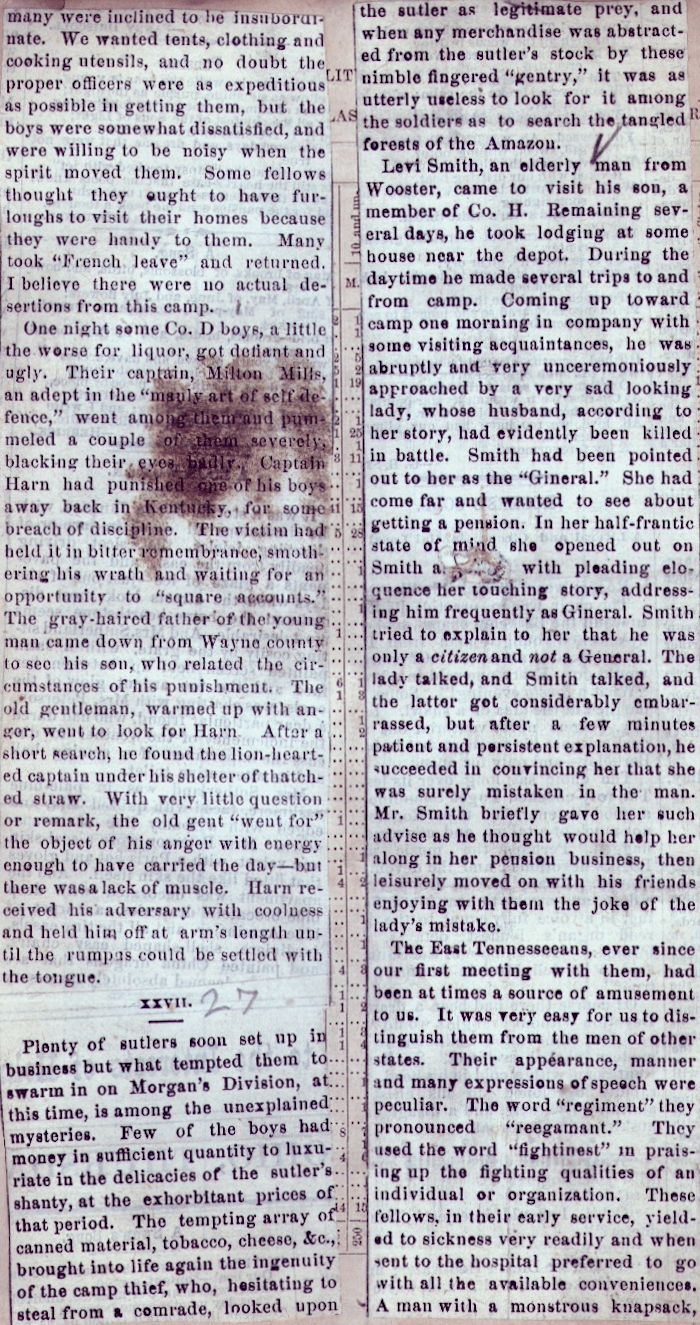| Camp & Field Page 41 | Camp & Field Index Page | 16th OVI Home Page | Camp & Field Page 43 |
The Camp & FieldArticles by Theodore Wolbach |
 Cpl. Theodore D. Wolbach |
The following image is taken from a book titled "Mortality and Statistics of the Census of 1850" in which it is believed retired Captain Rezin H. Vorhes, Company H, pasted over the pages a series of articles written by Cpl. Theodore D. Wolbach, Company E, titled "Camp and Field" and published, by chapter, in the Holmes County (Ohio) Republican newspaper from February 24, 1881 to August 17, 1882. The articles tell the story, in great detail and color, of the 16th OVI, from the inception of the 3-year regiment in October, 1861, through all its camps, battles and marches until it was disbanded on October 31, 1864. The articles pasted in the Vorhes book cover the first 35 chapters, published through October 20, 1881. All the remaining chapters were recently found in a Holmes County library by researcher Rob Garber who obtained copies, performed the transcriptions and provided to this website and which are also presented here, thus providing the complete work by Theodore Wolbach.
Throughout these articles click on the underlined white text for additional details.
The webauthor thanks 16th Ohio descendant Rob Garber for his excellent research on the Camp And Field articles and for performing the tedious digital transcription of those articles found on each page. The transcriptions were made to reflect the original articles verbatim, misspellings and all. Rob is the 3rd great nephew of Capt. William Buchanan, Company F, 16th Ohio, who served in the 90-day regiment as a private, re-enlisting in the three year regiment, and eventually making the rank of Captain of Company F. Thanks Rob!
Page 42 - Chapter 26, 27 - October, 1862
 |
many were inclined to be insubordinate. We wanted tents, clothing and cooking utensils, and no doubt the proper officers were as expeditious as possible in getting them, but the boys were somewhat dissatisfied, and were willing to be noisy when the spirit moved them. Some fellows thought they ought to have furloughs to visit their homes because they were handy to them. Many took One night some Co. D boys, a little the worse for liquor, got defiant and ugly. Their captain, Milton Mills, an adept in the Published in Holmes County Republican XXVII. Plenty of sutlers soon set up in business but what tempted them to swarm in on Morgan's Division, at this time, is among the unexplained mysteries. Few of the boys had money in sufficient quantity to luxuriate in the delicacies of the sutler's shanty, at the exhorbitant prices of that period. The tempting array of canned material, tobacco, cheese, &c., brought into life again the ingenuity of the camp thief, who, hesitating to steal from a comrade, looked upon |
the sutler as legitimate prey, and when any merchandise was abstracted from the sutler's stock by these nimble fingered Levi Smith, an elderly man from Wooster, came to visit his son, a member of Co. H. Remaining several days, he took lodging at some house near the depot. During the daytime he made several trips to and from camp. Coming up toward camp one morning in company with some visiting acquaintances, he was abruptly and very unceremoniously approached by a very sad looking lady, whose husband, according to her story, had evidently been killed in battle. Smith had been pointed out to her as the The East Tennesseeans, ever since our first meeting with them, had been at times a source of amusement to us. It was very easy for us to distinguish them from the men of other states. Their appearance, manner and many expressions of speech were peculiar. The word |
| Camp & Field Page 41 | Camp & Field Index Page | 16th OVI Home Page | Camp & Field Page 43 |